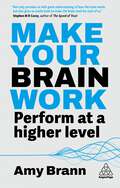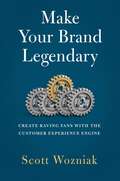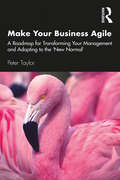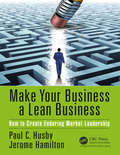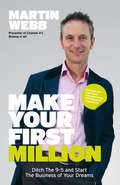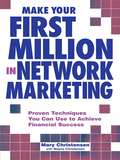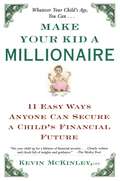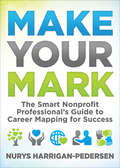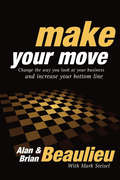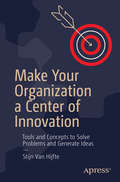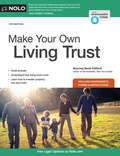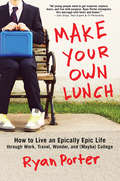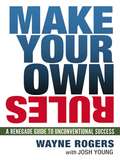- Table View
- List View
Make Your Brain Work: Perform at a Higher Level
by Amy BrannProductivity, efficiency and effectiveness are all under your control. But in today's fast-paced, high-demand workplace it can be overwhelming as you try to juggle a growing list of responsibilities, maintain your personal wellbeing and plan for long-term career success.Make Your Brain Work is a practical science-backed guide to help you sharpen your focus and help you perform at a higher level. It will help make your everyday life smoother and more rewarding. You'll learn how to tackle distractions, stay mentally sharp and build healthy workplace habits that will keep you performing at your best, without burning out.Whether you're looking to fast-track your career or simply make each day more manageable, author Amy Brann gives you the tools to do this. You'll discover how to boost your creativity, make smarter decisions and keep up in a world where being adaptable is a skill that will get you noticed.Your best self is within you and your brain has the ability to unlock this in your day-to-day life. Use the evidence-based brain-boosting techniques of Make Your Brain Work and perform better.
Make Your Brand Legendary: Create Raving Fans With the Customer Experience Engine
by Scott WozniakIn Make Your Brand Legendary, Scott Wozniak provides the tools every company needs to create a legendary brand with raving fans.Apple. Harley-Davidson. Chick-fil-A. Disney. When you see or hear these names, something in us lights up. Sure, we know their product and service offerings, but a huge number of consumers have a much deeper, more profound, and even emotional connection to these businesses. These aren&’t just brands; they&’re legendary brands. And they don&’t just have satisfied customers; they create raving fans—true believers who will buy every product, who serve as brand evangelists, who even tattoo corporate logos on their bodies, and who will fight to defend the honor and reputation of these multibillion-dollar corporations. Why? What turns otherwise reserved people into raving fans of a computer company or chicken sandwich chain? It&’s not magic. It&’s not a lucky product. And it&’s not something reserved for consumer brands with luxury products. For twenty years Scott and his team have been working with leaders in a wide variety of industries, from manufacturing to professional service to enterprise software. No matter the industry, some companies have gone beyond delivering a good product to delivering a great customer experience. In Make Your Brand Legendary, Scott Wozniak leverages his decades of brand-building experience within some of America&’s most-loved companies to show you how to create world-class customer experience. After years of battle-tested work, Scott realized that there was a set of systems that all the great brands used to create raving fans. He captured these practices in an engine diagram, a simple tool to help leaders become legends. If you use this approach, you can build a Customer Experience Engine that will create those same kinds of raving fans that always seem to dominate dinner-party conversations and water-cooler chats. Only this time, they&’ll be talking about your business.
Make Your Brand Matter: Experience-Driven Solutions to Capture Customers and Keep Them Loyal
by Steven G. SoechtigCombine brand and experience into a single, exciting whole to drive growth The Digital Transformation era has come and gone. Experiential concepts like personalization, transparency, transference, uniquity, and immediacy are now table stakes in an increasingly connected and responsive market. Companies that failed to ante up are already gone—or fading fast. In Make Your Brand Matter, serial entrepreneur and brand strategist Steve Soechtig delivers an eye-opening discussion of the post-Digital Transformation era in which we now live. The book walks you through the evolution of brand and experience, leveraging examples of historical and digitally native brands that have succeeded and failed to seize the digital moment. You&’ll discover brands that enabled new customer acquisition, customer value optimization, and customer loyalty, all the while realizing that brand and experience are two sides of the same coin. The book also offers: Strategies, techniques, and activities for teams to capture digital opportunities Discussions of why brand and experience reinforce one another and how experiences must embrace, reflect, and enforce brand identity Tactics to accelerate the customer&’s progression from evaluator to loyal advocateMake Your Brand Matter is an essential resource for marketing professionals. It also belongs on the bookshelves of company founders, owners, managers, executives, and other business leaders seeking to develop their organization&’s ability to marry brand and experience into one coherent and exciting package.
Make Your Business Agile: A Roadmap for Transforming Your Management and Adapting to the ‘New Normal’
by Peter TaylorBusiness Agility is an approach that gives the right business flexibility and fast decision-making in a volatile environment, providing a great capacity for innovation, adaptation and change. Businesses everywhere are trying to ‘get business agile’ – but it’s not easy to adapt to becoming this adaptive. How can conventional organisations succeed in this transformation? In this book, project and change management expert Peter Taylor walks you through the change process step by step, providing a tried and tested transformation roadmap: benefits are outlined, solutions to common challenges offered, and tried and tested methods and tools provided. He guides you towards a decentralised management style that offers more successful decision making through collaboration. By reducing processes, adjusting the governance and believing in ‘the power of the people’ to deliver simple success in a time of complex demand, the guidance in this book will help any manager get Business Agile.
Make Your Business a Lean Business: How to Create Enduring Market Leadership
by Paul C. Husby Jerome HamiltonMake Your Business a Lean Business is a written by business leaders for business leaders as a how-to guide to building enduring market leadership. Written by authors with more than 60 years’ experience applying Lean to operations and businesses, this book will allow readers to understand Lean principles and apply practices to transform their business. It also Shows readers how to transform their business to a Lean business using Lean philosophy, values, practice, and tools Is a comprehensive Lean Enterprise Operational Management System implementation guide that defines the Lean Enterprise Business Model Uses personal author experiences throughout the book to illuminate and reinforce concepts and practices Provides insights and a roadmap so executives can take immediate action to start building a Lean business Readers will be able follow a logical path aligning their business from strategy to detailed activity, thereby engaging their entire organization in becoming more competitive. It is the only true enterprise book about applying Lean to the entire business, and it provides business leaders with the understanding, approach, and tools to plan, align, and transform their business starting with their core business value proposition, business planning, disciplined goal and resource alignment, and implementation management.
Make Your Contacts Count: Networking Know-How for Business and Career Success
by Anne Baber Lynne WaymonThis book is a practical, step-by-step guide for creating, cultivating, and capitalizing on networking relationships and opportunities.Updated from its first edition, Make Your Contacts Count now includes expanded advice on building social capital at work and in job hunting, as well as new case studies, examples, checklists, and questionnaires.You will discover how to:draft a networking plancultivate current contactsmake the most of membershipseffectively exchange business cardsavoid the top ten networking turn-offsshare anecdotes that convey character and competencetransform your career with a networking makeoverJob-seekers, career-changers, entrepreneurs, and others will find all the networking help they need to supercharge their careers and boost their bottom lines. Packed with valuable tools, Make Your Contacts Count offers a field-tested "Hello to Goodbye" system that takes you from entering a room, to making conversations flow, to following up.
Make Your Dealers Your Partners
by Donald V. FitesA decade ago, many observers predicted Caterpillar's demise. Yet today the company's overall share of the world market for construction and mining equipment is the highest in its history. And the biggest reason for the turnaround, writes Caterpillar's chairman and CEO Donald Fites, has been the company's system of distribution and product support and the close customer relationships it fosters. The backbone of that system is Caterpillar's 186 independent dealers around the world. They have played a central role in helping the company build close relationships with customers and gain insights into how it can improve products and services.
Make Your First Million
by Martin WebbNever has advice on making money been so essential! Many of the world's most successful businesses started during an economic downturn, so don't let the credit crunch stop you. Make Your First Million shows you how to go it alone and make the money come rolling in! This straight-talking reality-check is one of the UK's bestselling entrepreneurship titles of the last 18 months and in this new edition Martin shows you just how important it still is to follow your dreams - even in tough times.This edition includes a brand new introduction on why entrepreneurship is the right choice, even in the current financial climate. Martin Webb started his first business in the recession of the early 90s and expounds the myths surrounding stating in a recession and outlines the possible benefits and advantages - as well as the cautions.Includes:A look at the personal attributes you'll need and how to develop themA real understanding of the impact of starting a business on your lifestyle and relationshipsAn outline of the skills and knowledge needed to make your enterprise thriveInformation on finance and how to minimise riskA unique Entrepreneur's Toolkit packed with practical steps to success"The book contains a lot of advice for those with ambitious growth plans in mind." (Growing Business, June 2007)"As a highly readable primer in the art of making a success of a start-up it takes some beating." (Better Business, June 2007)
Make Your First Million In Network Marketing
by Mary Christensen Wayne ChristensenNetwork Marketing has seen a remarkable expansion of late, with entropreneurs benefitting from an unheralded demand for their services.The authors of this book demonstrate proven techniques to achieve financial success in Network Marketing, which include:How to conduct successful business launch parties, party plans and business meetings.Breakthrough networking tips that get appointments booked.Practical advice on organising business finances, buying supplies, tracking expenses and balancing the books.Simple techniques to track customer needs, previous purchases, personality and lifestyle.There is little doubt that Network Marketing techniques will become increasingly deployed in the business world, with the advent of online business and customer-focused selling, Make Your First Million in Network Marketing provides all the information needed to succeed in this field.
Make Your First Million In Network Marketing: Proven Techniques You Can Use to Achieve Financial Success
by Mary ChristensenNetwork Marketing has seen a remarkable expansion of late, with entropreneurs benefitting from an unheralded demand for their services.The authors of this book demonstrate proven techniques to achieve financial success in Network Marketing, which include:How to conduct successful business launch parties, party plans and business meetings.Breakthrough networking tips that get appointments booked.Practical advice on organising business finances, buying supplies, tracking expenses and balancing the books.Simple techniques to track customer needs, previous purchases, personality and lifestyle.There is little doubt that Network Marketing techniques will become increasingly deployed in the business world, with the advent of online business and customer-focused selling, Make Your First Million in Network Marketing provides all the information needed to succeed in this field.
Make Your Kid A Money Genius (Even If You're Not): A Parents' Guide for Kids 3 to 23
by Beth KoblinerThe New York Times bestseller that is a must-read for any parent! From Beth Kobliner, the author of the bestselling personal finance bible Get a Financial Life—a new, must-have guide showing parents how to teach their children (from toddlers to young adults) to manage money in a smart way.Many of us think we can have the “money talk” when our kids are old enough to get it…which won’t be for years, right? But get this: Research shows that even preschoolers can understand basic money concepts, and a study from Cambridge University confirmed that basic money habits are formed by the age of seven. Oh, and research shows the number one influence on kids’ financial behaviors is mom and dad. Clearly, we can’t afford to wait. Make Your Kid a Money Genius (Even If You’re Not) is a jargon-free, step-by-step guide to help parents of all income levels teach their kids—from ages three to twenty-three—about money. It turns out the key to raising a money genius isn’t to teach that four quarters equal a dollar or how to pick a stock. Instead, it’s about instilling values that have been proven to make people successful—not just financially, but in life: delaying gratification, working hard, living within your means, getting a good education, and acting generously toward others. More specifically, you’ll learn why allowance isn’t the Holy Grail when teaching your kid to handle money, and why after-school jobs aren’t always the answer either. You’ll discover the right age to give your kid a credit card, and learn why doling out a wad of cash can actually be a good parenting move. You don’t need to be a money genius to make your kid a money genius. Regardless of your comfort level with finance—or your family’s income—this charming and fun book is an essential guide for passing along enduring financial principles, making your kids wise beyond their years—and peers—when it comes to money.
Make Your Kid a Millionaire
by Kevin MckinleyA STEP-BY-STEP PROGRAM THAT SHOWS PARENTS WHAT TO DO AT EACH STAGE OF A CHILD'S LIFE TO PROVIDE WEALTH FOR THE NEXT GENERATION. If you're like most parents, you know that you should start saving for your children's future but you're just not sure where to begin. In Make Your Kid a Millionaire, Kevin McKinley presents eleven easy ways parents can give their children a college education, a home, a comfortable retirement, and a chance to reach their goals without looking to you for money. With a commonsense approach, McKinley takes the reader from the birth of a child into adulthood and Guides parents through market swings Shows parents and grandparents how to cut their tax bills as they grow their family net worth Recommends "catch-up" tips to parents who haven't started saving yet Shows you where to find money to save Whether you earn six dollars an hour or six figures a year, Make Your Kid a Millionaire helps your kids acquire everything that more money can provide: Time. Knowledge. Security. Stability. And it will grant you the peace of mind that comes with supplying your children with a financial head start.
Make Your Mark: A Guidebook for the Brave Hearted
by Margie WarrellGet unstuck and chart your best course towards your biggest life If you've ever wondered if there's more to life than the one you're living, this book is for you. In 7 simple steps Make Your Mark will show you how to reset your compass to bring your boldest dreams into reality and make your own special mark on the world. Whether you want to get more enjoyment from the path you're on or completely over-haul your life, you'll learn valuable tools to map out a plan, achieve your biggest goals and overcome any challenge. Written with the realness and practical wisdom we've come to expect from bestselling author Margie Warrell, it combines insightful advice with powerful questions to help you dig beneath your deepest fears and enjoy more of what you've longed for — in your work, relationships and life. Of course, changing what hasn't been working in your life requires courage. Courage to take risks and trade the familiarity of the known for the possibilities of your future. If you're ready to get out of the stands and take full ownership of your life, then grab a pen and get ready to bring your bravest self forward to create your biggest life. Rediscover your passion and clarify the highest vision for your life Upgrade your mental maps and rewrite the stories holding you back Reclaim the power your fears have held over you, often unconsciously Recharge your motivation with daily rituals that amplify your strengths and bring out the best in those around you Your future is still unwritten. Taking time to Make Your Mark will arm you with the clarity, confidence, and courage you need to write a story you'll be forever proud to tell.
Make Your Mark: Lessons in Character from Seven Presidents
by Mark K. UpdegroveThe award-wining author of Second Acts and The Last Republicans draws on interviews and conversations with seven presidents to identify the essence of character, leadership and legacy that has defined each of them and the modern American presidency.Throughout his career as an author, journalist, television commentator, and head of a presidential library and foundation, Mark Updegrove has had the privilege of getting to know seven U.S. Presidents, from Gerald Ford to Barack Obama. In Make Your Mark, he offers incisive, compelling sketches of these modern presidents and the character trait that made each suited to his moment in the Oval Office and underlies his most significant accomplishments.Gerald Ford’s instinct to do the right thing in the wake of Watergate;Jimmy Carter’s mission to do good in the areas of peace and human rights during his presidency and throughout his post-presidency;Ronald Reagan’s optimism, restoring the nation’s confidence and pride after a sustained period of demoralizing national setbacks;George H.W. Bush’s humility, helping to ensure a peaceful end to the Cold War that had seethed between the superpowers for over forty years;Bill Clinton’s resilience and determination to keep working for the good of the American people in the face of political and personal obstacles;George W. Bush’s charge to give back as the deadly AIDS epidemic spread unchecked throughout much of the developing world;and Barack Obama’s grace as the first African American to hold the country’s highest office. Make Your Mark reveals that there is no one-size-fits-all model for leadership. We all have our own set of strengths and weaknesses. But drawing on these presidential examples, we can ask ourselves how our character reflects our leadership, and be inspired to find the very best in who we are to make own unique marks as leaders.
Make Your Mark: The Smart Nonprofit Professional’s Guide to Career Mapping for Success
by Nurys Harrigan-PedersenMake Your Mark guides those who want to change their career route to create an empowering, re-warding, and fulfilling journey towards having a job they love. What would it be like to have a job that makes you so happy you could sing, where your professional goals are aligned and make a significant impact in your personal life and on your family, those around you, and the world? For over fifteen years talent management and staffing expert Nurys Harrigan-Pedersen has helped professionals create career maps that have dramatically changed the course of their lives with the belief that everyone deserves to have a job they love. Follow the insightful and practical steps outlined in this guide and create a unique map that will make your life soar to unprecedented heights. Make Your Mark is the GPS of your professional life and will help you move forward with renewed enthusiasm and purpose. The best part: This GPS is programmed by you!
Make Your Money Smile: A Personal Finance How-to-Guide to Manage, Earn, Grow, Borrow, and Protect Your Wealth
by Jason VitugAre you tired of feeling overwhelmed by your finances? Do you wish there was a clear path towards financial well-being? Look no further than Make Your Money Smile, the groundbreaking new book by bestselling author Jason Vitug, winner of the prestigious 2023 Plutus Award. Make Your Money Smile covers every essential aspect of personal finance with precision and compassion. Jason acts as your guide, sharing lessons and steps, and giving you knowledge and tools to conquer your financial challenges once and for all. In this book, you'll learn to: Manage Money: Elevating your banking relationships and going beyond budgeting to cash flow mastery. Earn Money: Optimizing your paycheck and discovering the many ways to multiply and diversify your income streams. Grow Money: Making money work for you, contributing to retirement accounts, and investing for financial independence. Borrow Money: Using credit to build wealth, enhancing your credit report and score, and eliminating debt once and for all. Protect Money: Safeguarding your identity, insuring your most valuable assets, and protecting your wealth through tax strategy and estate planning. Don't let financial uncertainty hold you back any longer. Take a step toward a happier future. With insightful commentary and practical exercises, Make Your Money Smile is your indispensable companion on your journey to financial success. This book will empower you to take control of your finances and chart your course to your dream lifestyle.
Make Your Move: Change the Way You Look At Your Business and Increase Your Bottom Line
by Mark Steisel Brian Beaulieu Alan N. Beaulieu&“I wish I had known&” is commonly heard after major economic disruptions. Make Your Move shows you how to spot future changes well in advance so you have plenty of time to take advantage of them. It&’s packed with practical strategies and proven solutions that businesses of all sizes can immediately use to boost their bottom lines and strengthen their futures. For over 27 years, authors Alan and Brian Beaulieu have specialized in forecasting future economic changes for businesses. Their accuracy rate of 96% has helped their clients increase their profits and build for the future — even in the most severe economic downturns.
Make Your Organization a Center of Innovation: Tools and Concepts to Solve Problems and Generate Ideas
by Stijn Van HijfteThe call for innovation within both society and all sectors of enterprise at large grows louder every day. In order to achieve this, organizations need to attract talent with the insight and creativity necessary to be able to understand the needs of not only this generation, but also future generations. Make Your Organization a Center of Innovation introduces key frameworks that can be adapted to any business or team focused on innovation. Some aspects that are crucial for an organization to become a center of innovation are change management, process mining, and overall company strategy. Author Stijn Van Hijfte also introduces you to newer techniques that are still making their way up the ladder to overall industry adoption. These include AI, blockchain, and intelligent automation. Van Hijfte also takes care to ensure you choose the right innovation strategy for your specific company goals, as opposed to solely showing off the latest industry trends within the topic.Make Your Organization a Center of Innovation is perfect for business leaders, students, recruiters, and more. You will come away with insights about how to best prepare your team’s stakeholders for the changes that innovation brings. The mission and vision of your organization should always be promoting new ideas, but a roadmap is needed to implement them effectively. Make Your Organization a Center of Innovation is the guide you’ve been seeking.What You Will LearnDiscover key innovation and idea generation frameworks that can be molded to suit your organizationPrepare stakeholders for the changes that will take placeChoose the right strategy for the mission and vision of the company Create an environment that actually promotes new ideasWho This Book is ForProfessionals that have an interest in innovation and want to have a high-level understanding of technologies and trends that could be useful in their search towards new solutions.
Make Your Own Job: How the Entrepreneurial Work Ethic Exhausted America
by Erik BakerA sweeping new history of the changing meaning of work in the United States, from Horatio Alger to Instagram influencers.How Americans think about work changed profoundly over the course of the twentieth century. Thrift and persistence came to seem old-fashioned. Successful workers were increasingly expected to show initiative and enthusiasm for change—not just to do their jobs reliably but to create new opportunities for themselves and for others. Our culture of work today is more demanding than ever, even though workers haven't seen commensurate rewards.Make Your Own Job explains how this entrepreneurial work ethic took hold, from its origins in late nineteenth-century success literature to the gig economy of today, sweeping in strange bedfellows: Marcus Garvey and Henry Ford, Avon ladies and New Age hippies. Business schools and consultants exhorted managers to cultivate the entrepreneurial spirit in their subordinates, while an industry of self-help authors synthesized new ideas from psychology into a vision of work as “self-realization.” Policy experts embraced the new ethic as a remedy for urban and Third World poverty. Every social group and political tendency, it seems, has had its own exemplary entrepreneurs.Historian Erik Baker argues that the entrepreneurial work ethic has given meaning to work in a world where employment is ever more precarious––and in doing so, has helped legitimize a society of mounting economic insecurity and inequality. From the advent of corporate capitalism in the Gilded Age to the economic stagnation of recent decades, Americans have become accustomed to the reality that today’s job may be gone tomorrow. Where work is hard to find and older nostrums about diligent effort fall flat, the advice to “make your own job” keeps hope alive.
Make Your Own Living Trust
by Denis CliffordSave your family time, money, and headaches Unlike a will, a living trust lets your family bypass probate court—which saves everyone money, delay, and hassle. Whether you are single or part of a couple, Make Your Own Living Trust can help you make a living trust that’s valid in your state. Use this book to: decide whether a living trust is right for your family name beneficiaries to inherit your assets appoint someone to manage trust property inherited by children keep control over trust property while you live appoint someone to manage trust property if needed, and transfer all types of assets to your trust, including real estate, stocks, jewelry, art, or business assets. The legal forms in this book are not valid in Louisiana. Downloadable forms for book at nolo.com through a special link.
Make Your Own Living Trust (6th edition)
by Denis CliffordThis workbook helps individuals and couples worth one or two million dollars understand the benefits of creating a living trust, choose which property to put in the living trust, prepare the living trust document without a lawyer, and make changes to the document.
Make Your Own Lunch
by Ryan PorterHelping young people find their path to a successful future-with or without college College isn't right for everyone. And as tuition costs continue to rise, more and more young people-from straight-A students to the not-so-avid pupils-are choosing an alternative to the 4-year degree. Yet there is little support to help them find their track to a promising future beyond the classroom. Make Your Own Lunch empowers and guides young people as they search for their answer to the age-old question: "What do you want to be when you grow up?" Readers discover new ways to pursue their interests and gain experience through travel, philanthropy, and more.
Make Your Own Map: Career Success Strategy for Women
by Kathryn BishopThere's no such thing as a pre-set path to career success. Following the footsteps of others can only get you so far - and for women, there are often additional obstacles. But what if you could design your own path to your career goals? What if you could Make Your Own Map?Based on material from the popular Women Transforming Leadership course from Saïd Business School, University of Oxford, Make Your Own Map will help you develop a resilient and aspirational strategy for your career - whatever your starting point. Effective methods of strategic planning have been tried and tested in the corporate business world, and this book shows you how to repurpose those methods for yourself, even if you're not in the corporate world. Packed with strategic tools and practical exercises, this book will help you: -Assess and define your career goals-Make a plan-Implement your plan to find the work that fits your needs, your skills, and your direction.With your best career as the goal, this book will help you forge your own path and Make Your Own Map.
Make Your Own Money: How Kids Can Earn It, Save It, Spend It, and Dream Big, with Danny Dollar, the King of Cha-Ching
by Ty Allan JacksonThis fun and practical guide to financial literacy and entrepreneurship inspires kids to dream big and teaches them to make, save, and spend wisely, one penny at a time.
Make Your Own Rules: A Renegade Guide to Unconventional Success
by Wayne RogersALA Booklists Top Ten Business Books" 2011 Its hardly a secret that the corporate ladder is no longer the path to success it once was. Wayne Rogers star of the classic TV series M*A*S*H* has had even more success as a businessman and entrepreneur than as an actor. Applying his own unique viewpoint to a wide range of businesses (a restaurant, a vineyard, a chain of convenience stores, the world of banking, real estate, a film distribution company, and even a famous bridal boutique), the iconoclastic star has steadfastly refused to accept limitations, and boldly forged a path for himself beyond the stifling constraints of the corporate system. Filled with insights and engaging stories, Make Your Own Rules paints a fascinating portrait of how Rogers excelled precisely because he didnt have prior experience in each of these businesses or any preconceived notions of how they should be run. Rogers reveals the keys to his success over the past four decades lessons that are even more important today. After all, in the current economic climate, learning to be creative, challenge convention, and seize unexpected opportunities is not only liberating it can make all the difference to success. Anyone who yearns to succeed without the burdens of corporate culture can thrive outside the establishment. Whether you are an entrepreneur, a small business owner, changing careers, or just entering the workforce, Make Your Own Rules delivers the inspiration and guidance you need to climb the ladder of your choice.
